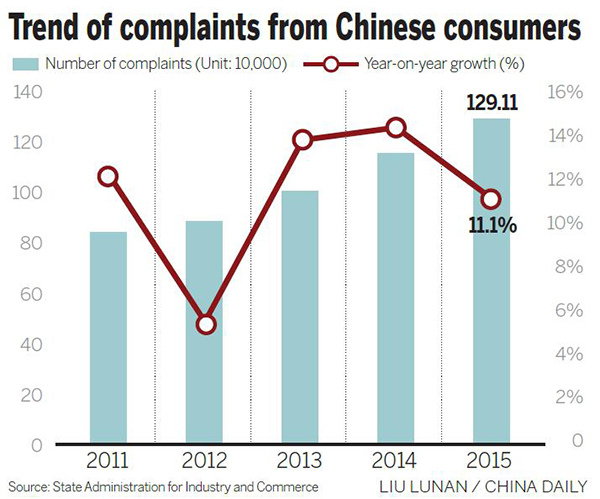
Staff with the local administration for industry and commerce in Hefei, capital of Anhui province, teach consumers how to tell fake products from genuine ones. (Photo/Xinhua)
The State Administration for Industry and Commerce, China's market watchdog, has reported an 11.1 percent rise in consumer complaints last year, with the most received for automobile parts and servicing and mobile phones.
The total number of complaints filed with the SAIC hit 12.9 million, a five-year high.
Most individual grievances focused on quality, contracts and post-sales services, with high rises too in the quality of contracts and on allegations of misleading advertisements.
The most-complained-about categories were daily necessities (160,600), telecommunications networks (124,900), home appliances (97,800), transportation (93,500) and food (66,500).
Those combined took up 74.9 percent of total volumes.
Within the all-important services sector, the top five most-complained-about areas were distance shopping, residential services, telecommunication, online services and repairs.
Complaints about automobiles and parts, and mobile phones grew 37.3 percent and 9.7 percent, respectively.
Within the former, consumers complained about 30.76 of every 10,000 vehicles sold, the figures showed, nearly double the number compared with five years ago, the SAIC said.
There were 122,800 mobile phone complaints, within a total 500 million devices sold last year.

The SAIC said it dealt directly with 1.21 million complaints in 2015, a 12.2 percent rise on the previous year, which involved transactions worth 3.79 billion yuan ($584 million).
Online shopping led to 145,800 individual consumer complaints, up 87.3 percent, with the quality of items and the truth of advertising triggering the most consumer anger.
The rapid development of domestic and outbound tourism-which last year was worth 4 trillion yuan-also led to a 43.5 percent surge in complaints, although the total number was still relatively small at 2,524.
Most of those involved the opacity of contracts, difficulty in getting refunded, false advertising, pushy sales techniques.


















































